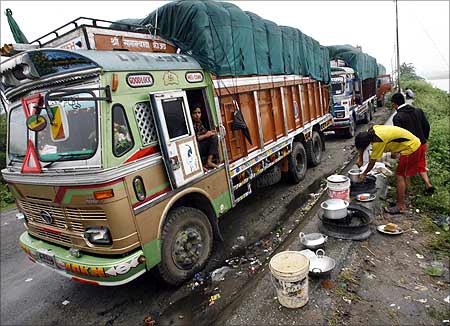 | « Back to article | Print this article |

One should leave further changes to an empowered GST Council
The Parliamentary committee that has examined the legislative Bill to introduce the goods and services tax in the country has recommended two significant changes.
One seeks to limit the applicability of the proposed one per cent additional tax on all inter-state movement of goods and services to only such supplies that are undertaken with 'a consideration'.
In other words, the one per cent additional tax will not apply to such inter-state movements of goods and services, which are just transfers from one depot of a company in one state to another in a different state.
The second recommendation proposes that the period for which the Centre will compensate the states for their revenue loss as a result of the introduction of the GST regime will be five years instead of three years.
Both the changes will address, though only partially, some of the concerns that have been rightly raised by industry, experts and some political parties over the many imperfections in the proposed GST regime.
The cascading effect of the additional one per cent tax without any set-off benefits was a genuine cause for concern.
By restricting it to sales, a large number of companies would be exempted from paying it on their inter-state and inter-depot movement of goods.
Imports would continue to enjoy a tariff advantage over domestically produced goods, but the damage earlier feared should be considerably minimised.
And if the government’s current thinking is any indication, there is a likelihood of the actual rate of the additional tax going down gradually before it is completely removed.
Similarly, extending the period of compensation for revenue loss incurred by states to five years will provide the much-needed comfort to states that are worried over the likely revenue loss after they adopt the GST regime.
Such an assurance should help win over many states, some of whom are at present reluctant to join the GST regime not just for the potential revenue loss but, more importantly, for the loss of their freedom to fix as well as change tax rates.
It would however be naïve to believe that the proposed GST regime, after the incorporation of these two changes, will become a perfect model to convert the country’s 29 states and seven Union territories into a completely barrier-free national market with a wider tax base and improved ease of doing business.
This is because the proposed GST framework has many flaws; it may exclude major items like alcohol, tobacco and petroleum products from its purview and the revenue neutral rate or the combined incidence of the state-level and central GST may be fixed at an unreasonably high level at 27 per cent.
The goal of widening the tax base may also remain unrealised if so many items are kept outside the purview of the GST.
It will be important to bring more goods under the GST regime so that the overall revenue neutral rate can come down to a more reasonable rate of 18 per cent, the level recommended by expert committees in the past.
India has waited for more than a decade to introduce the GST regime. In chasing a perfect GST, the government may lose more, crucial, time.
It would, therefore, make sense for members of Parliament to reach an agreement to pass the legislation that is now before them, after incorporating the suggested changes.
Further refinements like inclusion of more items within the GST framework and lowering the revenue-neutral rate can be left to the GST Council, which should be empowered to take such decisions and bring the new tax regime closer to what it ought to be.